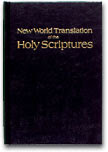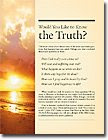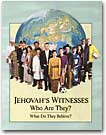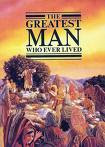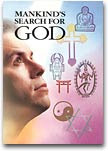Talking to Trinitarians can be hard. We may feel they disregard crystal-clear Scriptures that disprove the Trinity, wanting to stick to their traditions handed down to them and continue to "make the word of God invalid." (Mark 7:13) Verses such as John 14:28; 20:17; 1 Corinthians 11:3; 2 Corinthians 1:3 and Hebrews 9:24 seem to close the case against the Trinity. They just won't accept these!
This made me realize: Individual verses may not always have the desired effect. Sometimes we need to reason with them on certain points, like Paul did with the Thessalonian Jews. (Acts 17:1-3) With this in mind, I decided on three points that need to be reasoned upon:
1. Can God be tempted?
2. Can God walk among sinful humans?
3. Can God die?
Let us look at these in-depth later. First, we need to see exactly what the Trinity is.
There are many conflicting ideas of what the Trinity is. The most popular one is this: There exists God the Father, God the Son, and God the Holy Spirit. Yet, there are not three God's but one God. Each is co-equal and co-eternal, none of them having a beginning or an end.
Throughout the centuries there have been many ideas on how to explain the Trinity. Some say water, ice, and water vapor (an update of the "water-ice-fire" theory) are all different forms of the same water, using this to illustrate the relationship of the ones in the Godhead. Others will contradict such reasoning and say that even though God the Father, God the Son, and God the Holy Spirit area all one, they can appear separately. The water-ice-vapor theory does not allow that.
One chart that has been getting passed around a lot is this shown below.

This graph says that the Father is not the Son, the Son is not the holy spirit, and the holy spirit is not the Father and yet they are all God and they are all the same! Is it any wonder why the "Holy Trinity" is deemed a mystery (incomprehensible in the Athanasian Creed) that no one can understand? Ask: If Jesus said that the Jews "worship what [they] know" yet history proves that the Jews never believed in the Trinity*, then does that mean that Jesus' statement is false?-John 4:22
The truth is, it is as one encyclopedia says, "neither the word Trinity, nor the explicit doctrine as such, appears in the New Testament."** No, the Trinity is not a Bible teaching. How do we know? Let us answer each of the questions presented in the outset.
The disciple James said of God: "When people are tempted, they should not say, 'God is tempting me.' Evil cannot tempt God, and God himself does not tempt anyone." (James 1:13, New Century Version) This is obvious that God cannot be tempted because God is without sin. The very idea that God can sin is blasphemy. He does no unrighteousness. (Deuteronomy 32:4) Nobody, not even Satan the Devil, can make God sin.
If Christ was God, the same would apply to him. Nothing would ever be able to tempt the Lord. However, some may point to this Scripture in an attempt to prove that Jesus was never tempted, "He committed no sin, nor was deception found in his mouth." (1 Peter 2:22) No, Jesus Christ did not sin at all; that is not what I am trying to imply. Christ was a perfect man throughout his entire life. Is the fact that he did not sin enough to prove that, like God, he could not be tempted? Let us look at an account in the Gospel of Matthew.
"Then Jesus was led by the spirit up into the wilderness to be tempted by the Devil. After he had fasted forty days and forty nights, then he felt hungry. Also, the Tempter came and said to him: 'If you are a son of God, tell these stones to become loaves of bread.' But in reply he said: 'It is written, "Man must live, not on bread alone, but on every utterance coming forth through Jehovah’s mouth."'
"Then the Devil took him along into the holy city, and he stationed him upon the battlement of the temple and said to him: 'If you are a son of God, hurl yourself down; for it is written, "He will give his angels a charge concerning you, and they will carry you on their hands, that you may at no time strike your foot against a stone."' Jesus said to him: 'Again it is written, "You must not put Jehovah your God to the test."'
"Again the Devil took him along to an unusually high mountain, and showed him all the kingdoms of the world and their glory, and he said to him: 'All these things I will give you if you fall down and do an act of worship to me.' Then Jesus said to him: 'Go away, Satan! For it is written, "It is Jehovah your God you must worship, and it is to him alone you must render sacred service."' Then the Devil left him, and, look! angels came and began to minister to him."-Matthew 4:1-11
Now, if Christ was the God that cannot sin, why would the devil even bother to tempt him? The Scripture does not say that Jesus was led into the wilderness so that the devil could try to tempt him, but we are told this happened so that the devil could tempt him.
Some may say, "Even though the devil tried to tempt him, it didn't work. Jesus immediately denied the offers made." Yes, Jesus did immediately deny the temptations but is this enough to prove that he is the God that could not be tempted, or at least that the possibility stands?
No! God cannot be tempted, but Jesus was! We know that Jesus was tempted at some point in his life because the Scriptures say, "For we do not have a high priest who is unable to sympathize with our weaknesses, but we have one who has been tempted in every way, just as we are--yet was without sin." (Hebrews 4:15, New International Version) That is not something that can happen with God.
When we understand this about Jesus, the following account makes more sense. "And as he [Jesus] was going out on his way, a certain man ran up and fell upon his knees before him and put the question to him: 'Good Teacher, what must I do to inherit everlasting life?' Jesus said to him: 'Why do you call me good? Nobody is good, except one, God.'" (Mark 10:17-18) Why would the Lord say this if he was a perfect man? (Hebrews 7:26) Well, the main difference between God and Jesus is that Jesus could be tempted while God can never be tempted.
After looking at the first question, "Can God be tempted?", we see that Trinitarian beliefs on Jesus as God would cause a contradiction between Hebrews 4:15 and James 1:13. It would do well to rid yourself of any belief that causes a contradiction in Scripture.
"For all have sinned and fall short of the glory of God." (Romans 3:23) Think of the prophet Isaiah. Knowing he was a sinner, he did not feel worthy of being in God's presence. Look at this account:
"In the year that King Uzziah died I, however, got to see Jehovah, sitting on a throne lofty and lifted up, and his skirts were filling the temple. Seraphs were standing above him. Each one had six wings. With two he kept his face covered, and with two he kept his feet covered, and with two he would fly about. And this one called to that one and said: 'Holy, holy, holy is Jehovah of armies. The fullness of all the earth is his glory.' And the pivots of the thresholds began to quiver at the voice of the one calling, and the house itself gradually filled with smoke.
"And I proceeded to say: 'Woe to me! For I am as good as brought to silence, because a man unclean in lips I am, and in among a people unclean in lips I am dwelling; for my eyes have seen the King, Jehovah of armies, himself!'
"At that, one of the seraphs flew to me, and in his hand there was a glowing coal that he had taken with tongs off the altar. And he proceeded to touch my mouth and to say: 'Look! This has touched your lips, and your error has departed and your sin itself is atoned for.'"-Isaiah 6:1-7
Isaiah's sinful nature made him ashamed of being in Jehovah's presence. However, the prophet saw Jehovah for a reason. Jehovah had a mission for him. The meeting, though, could not proceed until after Isaiah's sins had been atoned for. This is a prime example of the point that Jehovah cannot have dealings with sinful humans.
Furthermore, we needed a reconciliation with God. We were once enemies of God and needed to be reconciled to Him--and a person only needs to be reconciled to another if they have separated themselves from that person. So we were separated from God. That is why the Bible says, "For if, when we were enemies, we became reconciled to God through the death of his Son, much more, now that we have become reconciled, we shall be saved by his life. And not only that, but we are also exulting in God through our Lord Jesus Christ, through whom we have now received the reconciliation." (Romans 5:10-11) We were only reconciled to Jehovah God through Jesus Christ, His Son.
To get a better picture of all of this, let us go back to the days of the Israelites. It was known that Jehovah would walk through the camp of the Israelites by means of an angel.* (Leviticus 26:12) However, there were certain requirements that the Israelites had to live up to for that privilege. For example, the Israelite camp had to be holy, with nothing indecent seen in it. If they sinned, Jehovah would leave it.-Deuteronomy 23:14
At one time, when the entire nation of Israel was still God's chosen people, he had no problems casting them off when their sin became too much. (Ezekiel 23:5, 9, 11, 28) Sin and God do not mix. The Bible clearly teaches, "For you are not a God taking delight in wickedness. No one bad may reside anytime with you." (Psalm 5:4) You can turn that around and say that God may not reside with anyone bad at any time.
But Christ was a different story. He came to earth as a man and lived among us. "So the Word became flesh and resided among us." (John 1:14) Isaiah tells us that Jesus allowed himself to be hit and spit upon. (Isaiah 50:6) Christ, not Jehovah God Himself, walked among us! Remember, Jehovah is "holy, holy, holy." (Isaiah 6:3) The original word rendered holy means "clean". So Jehovah is a clean God. On the contrary, we have on dirty garments, spiritually speaking. God had to use a perfect sacrifice, Jesus Christ, so that we could 'wash our robes and make them white in the blood of the lamb.'-Revelation 7:14
Truly, it was not until we were clean in God's eyes that we could have a reconciliation with Him. Yes, "God...reconciled us to himself through Christ and gave us the ministry of the reconciliation, namely, that God was by means of Christ reconciling a world to himself." (2 Corinthians 5:18-19) Before that reconciliation, Christ's death, we were separated from God. If God Himself had come to earth, it would mean that the reconciliation had already taken place. If two people are not speaking to each other, they only speak to one another again after they have been reconciled. So Christ could not have been God or he could have never come to reconcile us to him.
If you believe Christ is God, you have a contradiction between Psalm 5:4 and John 1:14. You should try to change your belief. You should rid yourself of any belief that causes a contradiction in Scripture.
Truly, this last question is the most important. Is it possible for God to die? The Bible says no. "Are you not from long ago, O Jehovah? O my God, my Holy One, you do not die." (Habakkuk 1:12, See Box Below) The Bible makes it clear that the true God is immortal.
The Following is Supplementary Information
"You do not die" or "We do not die"?
Many Bibles say one of two different things at Habakkuk 1:12. What are some of these things that are said in each translation?"We Will Not Die" "My God, my Holy One, we will not die." (NIV) "O LORD, my God, my Holy One? We will not die." (NASB) "O LORD my God, my Holy One? We shall not die." (ESV) "You Do Not Die" "My Holy One, You will not die." (HCSB) "O my God, my Holy One, you do not die." (NWT) "My God, my Holy One, you will never die." (TNIV)
Why do different Bible translations say different things? Well, simply put, different manuscripts say different things! Is there anyway to tell which ones are right? Yes!
In the past, a group of scribes (people that copied the Bible) took it upon themselves to copy the Bible--and "fix" the texts! These men removed anything that could be considered blasphemous in regard to God and put an alternate rendering that was "less blasphemous". Habakkuk 1:12 was not the only text changed by these scribes.
Look at two other verses changed by these scribes so that Jehovah will not be looked down upon or blasphemed. One Scripture says this: (Genesis 18:22) "At this point the men turned from there and got on their way to Sodom; but as for Jehovah, he was still standing before Abraham." (Correct Version) "Then the men turned away from there and went toward Sodom, while Abraham was still standing before the LORD." (Altered Version) The scribes changed this because they thought it was disrespectful to Jehovah to have Him standing before Abraham, so it was changed so that Abraham was standing before Jehovah.
One other change is this: (1 Samuel 3:13) "For I told him that I would judge his family forever because of the sin he knew about; his sons blasphemed God, and he failed to restrain them." (Correct Version) "For I have told him that I am about to judge his house forever for the iniquity which he knew, because his sons brought a curse on themselves and he did not rebuke them." (Altered Version) The scribes changed this because the idea of anyone blaspheming God was utterly heinous to them. So they changed the text to say that Eli's sons cursed themselves and not God.
The very idea that God could die offended the scribes so they changed the text, just like the two examples above.** What it really comes down to is which rendering makes more sense in light of the context. Does the context of the Scriptures surrounding Habakkuk 1:12 and contained in Habakkuk 1:12 show that Habakkuk was saying that God could not die?
Remember that Habakkuk is speaking to Jehovah, describing Him. He first tells Jehovah that He is from long ago. Then the prophet tells Him that He cannot die. Next Habakkuk tells Jehovah that He is too pure to look on badness. Since the entire context is describing Jehovah, it would be awkward if the subject changed from Jehovah to the Israelites and then back to Jehovah. Uniformity demands that the text say Jehovah cannot die. Context does not allow any other way.
The scribes went even further in another thing they did, not just changing a few Bible verses. They actually replaced the Name of Jehovah with the Hebrew word for "Lord" 134 times. All of the other times they just put a note under each occurrence of the Name to remind readers to say "Lord" instead of "YHWH".
The oldest and most reliable manuscripts show the original rendering of Habakkuk 1:12, Genesis 18:22, 1 Samuel 3:13 and the other Scriptures, and also show God's Name in all the places it is supposed to occur.
Speaking of Jehovah, the Bible says: "Even from time indefinite to time indefinite you are God." (Psalm 90:2) This Scripture states that He will always be God, He will continue to live forever as God. Being "to time indefinite" shows that Jehovah will never die.
What about Jesus? Jesus died. "Jesus shouted and then died." (Mark 15:37, Contemporary English Version) In fact, Jesus told the congregation in Smyrna that he was the one "who was dead." (Revelation 2:8, Holman Christian Standard Bible) Paul echoes similar words in one of his letters. (Romans 14:9) Yes, Jesus was fully dead. He was not alive. Now, if Jesus was God, then Habakkuk 1:12 would be contradicted which said that God cannot die!
Further, Jesus was dead for three days and was resurrected. "God raised him up from the dead." (Acts 3:15) If Jesus, being God, was actually dead, how did he raise himself up? If he was able to raise himself up then he wasn't really dead. And that presents a problem. "The Son of Man came...to give his soul [life, NIV] a ransom in exchange for many." (Matthew 20:28) "Christ was offered once for all time to bear the sins of many." (Hebrews 9:28) "While we were yet sinners, Christ died for us...we have been declared righteous by his blood." (Romans 5:8-9) Jesus had to have been dead or else we are not saved from our sins. And if he was God and raised himself up, he was not truly dead. Do you see the problem?
Jehovah is incorruptible, immortal. Jesus died. The Son is not God Almighty. Continuing to believe this presents a problem in Scripture too big to ignore. There can be no contradiction between two Bible texts, in this case Habakkuk 1:12 and Mark 15:37. It is always best to rid yourself of any belief that causes a contradiction in Scripture.
You have a choice. The Bible is one harmonious book. It clearly teaches that Jehovah and Jesus are not the same. You can choose to ignore that or accept it. Hopefully you accept it. What if you have read all of this and still cannot see the lack of logic in the Trinity teaching?
There is someone who does not want people to see the truth about the Trinity doctrine. He is called the "god of this world" and he has veiled the minds of the unbelievers so that the "glorious gospel of Jesus Christ...should not shine unto them." (2 Corinthians 4:4, King James Version) Only when "there is a turning to Jehovah" is the veil taken away.-2 Corinthians 3:16
The Trinity is doctrine promoted by Satan which has its roots in many ancient false religions. It is something that is hard to break away from but necessary. But you have to continue to tell yourself that it would be dishonest to hang on to a belief that you know to be false and, even worse, causes numerous contradictions in Scripture. You can beat the impulse to hang on to a false teaching. With prayer to Jehovah, the true God, you can get help to start on the way of the Truth!
---------------
For further information see the brochure, Should You Believe in the Trinity? published by Jehovah's Witnesses
*The Encyclopedia Americana, Vol. XXVII, p. 294L
**The New Encyclopedia Britannica, Vol. X, p. 126
*For the references that it was actually an angel in the camp instead of God Himself, please see Exodus 23:20-23. Also compare times when Jehovah was spoken of as doing something but it was revealed that it was an angel: Genesis 18:1-3; 19:1, 15, 18; Exodus 3:1-5
**A full list of altered Scriptures: Genesis 18:22; Numbers 11:15; 12:12;
1 Samuel 3:13; 2 Samuel 16:12; 20:1; 1 Kings 12:16; Jeremiah 2:11; Ezekiel
8:17; Hosea 4:7; Habakkuk 1:12; Zechariah 2:12; Malachi 1:13; Psalm 106:20;
Job 7:20; 32:3; 2 Chronicles 10:16; and Lamentations 3:20.19.








